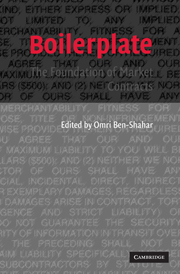Book contents
- Frontmatter
- Contents
- Preface
- List of Contributors
- PART ONE WHY IS BOILERPLATE ONE-SIDED?
- 1 One-Sided Contracts in Competitive Consumer Markets
- 2 Cooperative Negotiations in the Shadow of Boilerplate
- 3 Boilerplate and Economic Power in Auto-Manufacturing Contracts
- 4 “Unfair” Dispute Resolution Clauses: Much Ado About Nothing?
- 5 The Unconventional Uses of Transaction Costs
- PART TWO SHOULD BOILERPLATE BE REGULATED?
- PART THREE INTERPRETATION OF BOILERPLATE
- PART FOUR COMMENTARY
- Notes
- Index
4 - “Unfair” Dispute Resolution Clauses: Much Ado About Nothing?
Published online by Cambridge University Press: 02 December 2009
- Frontmatter
- Contents
- Preface
- List of Contributors
- PART ONE WHY IS BOILERPLATE ONE-SIDED?
- 1 One-Sided Contracts in Competitive Consumer Markets
- 2 Cooperative Negotiations in the Shadow of Boilerplate
- 3 Boilerplate and Economic Power in Auto-Manufacturing Contracts
- 4 “Unfair” Dispute Resolution Clauses: Much Ado About Nothing?
- 5 The Unconventional Uses of Transaction Costs
- PART TWO SHOULD BOILERPLATE BE REGULATED?
- PART THREE INTERPRETATION OF BOILERPLATE
- PART FOUR COMMENTARY
- Notes
- Index
Summary
Editor's Note:This chapter takes an empirical look at boilerplate terms that stand in the midst of much current controversy – the dispute resolution clauses. Using a dataset compiled from software license contracts, it finds no indication that these terms place hardships on consumers. Vendors choose governing law and forum, not to bar consumer protections or to deter lawsuits, but most often for simple convenience, directing the dispute to be resolved in their home state. Moreover, these terms are used less often than prior commentators feared.
Standard-form contracts governing consumer transactions often include clauses that specify how disputes will be resolved. Such dispute resolution clauses (DRCs) spell out which law should govern and in which forum a dispute should be heard. The choices made are important because they help determine whether a party will find it worthwhile to seek legal redress on being injured. And the possibility that such clauses specify laws and fora that are not mutually convenient for the buyer and the seller has multiplied with the growth in online commerce, as such commerce involves transactions between buyers and sellers that are often distant.
The use of DRCs in mass-market transactions, both online and traditional, has sparked controversy among academics and legislators. One position that some have taken is that liberal enforcement of DRCs is desirable. DRCs help sellers minimize costs associated with legal complexities of transacting in many states at once.
- Type
- Chapter
- Information
- BoilerplateThe Foundation of Market Contracts, pp. 45 - 65Publisher: Cambridge University PressPrint publication year: 2007
- 4
- Cited by



